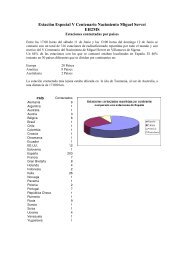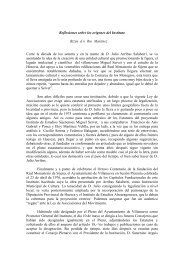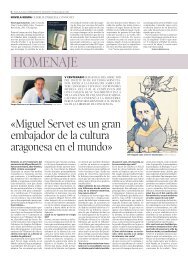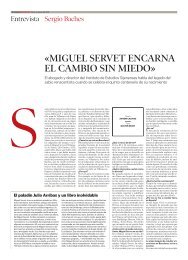New Page
New Page
New Page
You also want an ePaper? Increase the reach of your titles
YUMPU automatically turns print PDFs into web optimized ePapers that Google loves.
important, and directs attention to a number of other details. As it has been pointed out, the treatise does<br />
not show either the date or the place of the publication and does not say who the author is. The<br />
Transylvanian Antitrinitarians had published a number of works without giving the names of their<br />
authors, but if these works expressed views that were meant to be official and accepted by most of the<br />
congregations, the following formula was invariably used: +ministri et seniores ecclesiarum<br />
consentientium" [the ministers and elders of the consenting churches]. Since in this case this formula is<br />
missing, the publishers of the text must have distinguished it from the publications reflecting the official<br />
standpoint. So the circumstances of the publication suggest that the leaders of the Transylvanian<br />
Antitrinitarians related ambiguously to this work. They used its store of arguments but would not elevate<br />
the whole of what it had to say to official status.<br />
It would seem expedient, therefore, to scrutinize in some detail to what extent the most characteristic<br />
elements of Explicatio, deemed most important also with respect to intellectual history, are present<br />
in the works that appeared until the beginning of the 1570s. In this respect it is obviously the strong anti-<br />
Platonism, to be further developed by Sommer later in the 1570s, that needs emphasis here. The following<br />
are the expressions of anti-Platonism we have been able to collect from works published up to the early<br />
1570s:<br />
+We trust all pious and righteous men to judge how frivolous and Platonic it is to philosophize in<br />
religious matters on the basis of syllables and letters."148<br />
+You should try... to distinguish the knowledge of the prophets and the apostles from that of Plato<br />
and Trismegistus, from whom most of the scholastics took their own knowledge."149<br />
+But let us be satisfied for our salvation with the announced clear word of God and leave alone<br />
the speculations of Plato and Trismegistus, who are wailing in their opinions."150<br />
This is really not much, and the argumentation noted above is incomparably more frequent in the<br />
output of the times. This does not hold one or another current in philosophy responsible for the<br />
development of the Trinitarian dogma, but blames its opponents instead for trying to justify their fallacies<br />
with the writings of the +Greek sages". Therefore, what we have called the synthesis of the new<br />
Christology and Servet cleansed of Platonism was a tendency still going strong at the end of the sixties.<br />
We should remember that it was long after the religious dispute of Gyulafehérvár and Explicatio had<br />
gained prominence that De regno Christi, culled from Restitutio Christianismi, was published in 1569. Of<br />
course, the effort to reinterpret is doubtlessly present in that work as well. Points 17, 20, 23, and 26 on the<br />
table of the differences and correspondences (Appendix II) clearly show that they tried to include<br />
elements of the new Christology in that publication. There are, however, a number of problematical<br />
places; the passage beginning Eadem deinceps ratione... for example, translated with some changes into<br />
Rövid útmutatás, was left unchanged here. Of course, these details should not be overestimated in a work<br />
that borrows whole chapters from Servet's work. Neither should we ignore them, though, since -- as we<br />
have seen -- even before editing De regno Christi they had been concerned with Christiani restitutio for a<br />
long time, which also meant translating significant parts into Hungarian. Dávid's book of sermons, using<br />
Servet's texts from Rövid útmutatás along with the explications of the two Sozzinis, also relies on it to a<br />
great extent.<br />
All this, however, is not marked by any polarized Platonism; it might be said with Rotondo151 that<br />
Platonism is dissolved in a more general opposition to philosophy. Let us add for the sake of precision<br />
that such an interpretation was by no means alien to the spirit of Lelio Sozzini's treatise either since in the<br />
name of biblical simplicity he reproaches those who study Greek philosophy day and night. It would be<br />
more to the point to say that Ferenc Dávid amplifies, and gives a dominant role to, this tendency of the<br />
48







